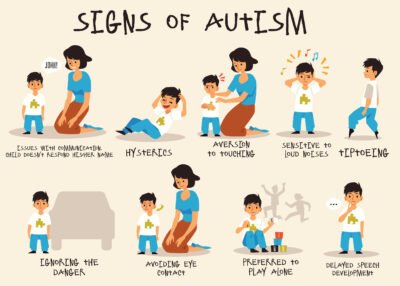Belgium (Brussels Morning Newspaper) This June, the EU Commission announced a $1.3 billion funding package to tackle mental health in Europe, which vice-president Margaritis Schinas calls a “silent epidemic”. It will be deployed as part of a new ‘comprehensive’ and ‘prevention-oriented’ plan for improving mental health outcomes across the bloc.
Despite the jargon, the Commission’s goal is a practical one: which is to encourage more flexibility and understanding across society when it comes to mental health. This will be critical for dismantling some of the structural barriers that certain groups still face when seeking support – particularly those with neurodevelopmental disorders like autism.
This issue is not as niche as one might think. According to Autism-Europe, there are an estimated 5 million people in the European Union living with an autism spectrum disorder (ASDs) – with a prevalence in some member states of about 1 in 89 people.
The chances are that most people reading this will have a friend or family member who is autistic or knows someone who does. I myself am a proud auntie of two autistic nephews and often deal with ‘neuro-divergent’ patients in my dental practice. Each has its own unique developmental challenges to face, but all are united by a common need for understanding and respect from society.

Sadly, autism remains widely misunderstood and stereotyped in many quarters, stemming from a basic lack of knowledge about what the condition is, and – just as key – what it isn’t. This poses significant problems for our efforts to effectively care for autistic folk, particularly in medical settings.
Take dentistry as an example. Many don’t realize that autism can be a real barrier to securing good oral health outcomes, due to the unique experiential challenges they face.
Difficulties with sensory processing can be a major feature of autism, leading to both compulsive (sensory-seeking) and avoidant (sensory-avoiding) behaviors. For many, the mere act of brushing their teeth can set off sensory alarm bells which trigger an intensely negative emotional reaction.
Going to the dentist can be an even bigger ordeal. The lights, sounds, and occasional physical discomfort involved in that experience can be tough to endure and leads many autistic patients to forgo dental treatment altogether.
Sensory-seeking behaviors can be equally destructive. The compulsive urge to seek out foods of a certain texture, taste, and smell – particularly super-stimulating foods like sugar – can wreak havoc on the mouth; and has a knock-on effect on the wider body as well.
One scientific study which set out to measure tooth decay (dental caries) in patients aged 6-16 found that ‘children with autism exhibited a higher caries prevalence, poor oral hygiene and extensive unmet needs for dental treatment’. Another study has corroborated this, finding that unmet dental needs were a key driver of oral health issues amongst autistic children in South Africa.
Overcoming such hurdles will require a concerted effort on behalf of dentists to tailor their treatments to the unique needs of their autistic patients. First and foremost, this will mean upgrading the maintenance and prevention tools they generally prescribe, so that autistic patients can find solutions that are actually applicable to their lives.
In this, there can be no ‘one size fits all’ approach. Some may prefer to use an electric toothbrush due to its sensory feedback, while others may struggle to withstand even a soft manual toothbrush. Happily, there is a range of brushes and toothpaste available aimed at those with sensory issues – and finding the right one for each patient will require communication and experimentation between them and their clinician.
Tailored tips for improving diet can help too. As both a dentist and a trained nutritional therapist, I always offer dietary advice to my patients. This proves trickier when dealing with autistic patients with a strong sensory compulsion to consume sugar, however, there are solutions available.
For example, a growing body of evidence links sugar-free chewing with significant benefits for oral health and dieting. By stimulating the production of saliva, gum serves to remove food debris and neutralize harmful acids in the mouth – whilst also suppressing cravings and promoting a feeling of fullness.
For those with autism, it may be that the sweet, sensory aspects of gum could have additional benefits as well. Researchers have found that the act of chewing gum can be an effective treatment for anxious rumination (over-thinking), by bringing the user’s mind back into the present moment. They concluded that gum is a ‘novel, non-intrusive, and highly effective for treatment for intractable rumination’, particularly for those with autism.
Sugar-free gum may therefore be a small but valuable tool for improving the oral health of autistic patients, whilst bypassing some of the sensory challenges they may face.
As mentioned at the start of this article, I have two autistic nephews – and both have their own individual needs, impulses, likes, and dislikes. Autism is a spectrum, which means that every autistic person is as unique and individual as anybody else is.
This underlines the need for dentists to craft their treatment plans for autistic patients in a way that is both bespoke and holistic. In dental offices, as in families, the best playbook will always be communication and experimentation with autistic loved ones, so that a healthy lifestyle can be secured in a way that works for everyone.
This is not an easy balance to strike, however, dentistry could go much further in becoming more open, accessible, and responsive to the needs of autistic patients. As Ursula von der Leyen says: “We should take better care of each other. And for many who feel anxious and lost, appropriate, accessible, and affordable support can make all the difference”.
Opinions expressed in the op-ed section are solely those of the individual author and do not represent the official stance of our newspaper. We believe in providing a platform for a wide range of voices and perspectives, even those that may challenge or differ from our own. As always, we remain committed to providing our readers with high-quality, fair, and balanced journalism. Thank you for your continued support.Sincerely, The Brussels Morning Team




